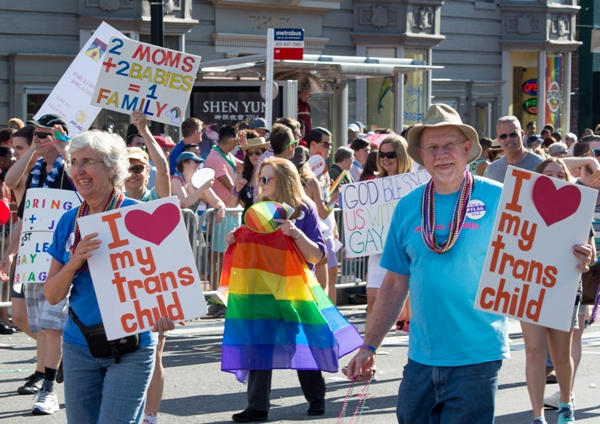
“Mom, when is my penis coming in?”
“Oh, honey, girls have vaginas, so…”
“Yea, but, mom, when will mine come in?”
“You were born with a vagina, honey.”
“But MOM!”
“Fine, when you’re 18, we can get you a penis.”
How am I supposed to answer that question from my four-year-old daughter?
I had a whole story in my head and my heart about what it meant to raise a girl. The fantasy included manis and pedis, shopping, and heart-to-heart talks on how to be an empowered woman in today’s society. Maybe she would share my passion for yoga, we would do lunch and watch chick flicks. From the little headbands and ruffled tights, to the flowery pink bedroom, it was all planned out.
I don’t remember answering questions about changing genitals being any part of it.
So, I shook it off, buried it, even made little jokes about it, hoping, like with all things children, it was “just a phase.” The phase never ended. I accepted her decision to wear boys clothes, because she said, “Girls clothes are too snuggy.” She was right—why were the clothes so form-fitting for a little child, and what the hell was with the glittery writing on the bum, anyhow? I figured perhaps she had some sensory issues so I let go of the shopping dream.
One dream at a time, I began to realize that my child did not get the script that I had written for her life. With each symptom that manifested and took over my child—anxiety, depression, stuttering, stammering, hair pulling, skin picking, sleep disorders—each part of my dream was being chipped away.
There would be no nail polish, no princess costumes, no ladies that lunch. The reality of sitting with the other mothers of girls my child’s age talking about girly things should have been a bigger clue. Oh, little “so and so” got a new tutu for dance class? My daughter just picked out a spiffy new pair of crisp khakis with a button down shirt and a bow tie.
My dream didn’t fit my reality, and our reality didn’t fit with anyone around us.
When she was 15, the truth of who my child was came out. My daughter was, in fact, my son. It turns out my estimation about when his penis would come in was two years off; we bought his first “packer” at age 16.
Finally, the puzzle pieces that represented my child falling apart made sense, but untangling people’s perceptions proved to be the biggest challenge. Other parents considered it weird that their kid’s female classmate had a new gender and name. That’s confusing, and they likely didn’t know how to talk to their children about it. The school had never dealt with this and were not able to be an advocate. At the time, my son was the first “out” trans kid in our little neck of the woods—a small, sports-minded, socially republican community.
As it stood, the town wasn’t really the perfect fit for me: a liberal, yogi, Jew with big hair and an affinity for the marijuana. Sure, I could small-talk it up in the supermarket with the other moms, but I certainly wasn’t sitting on the bleachers with my giant Dunkin’ Donuts cup filled with wine or vodka, talking about my kids’ athletic accomplishments with them. I don’t even own a sparkly Red Sox cap or a Patriot’s shirt.
We revealed the news when the subject of transgender lay dormant just under the surface, before it had exploded as a trendy, highly-debated and very divisive topic. No one talked about it, therefore it didn’t exist.
There wasn’t Caitlyn Jenner as a reference point; the bathroom bill was a non-issue. We were an anomaly, a sore thumb that stuck out. People reacted in a wide spectrum, with one end being unwavering support, and the other in disdain. In the middle of that spectrum was a large number of dropped eye gazes and discomfort when they saw us coming. I wondered, were they afraid to say the wrong thing?
I can’t speak for everyone in this situation because each transition has its own unique sets of circumstances. With great empathy, I acknowledge this may be unchartered territory to navigate through when discussing with your own children. I offer these as a map to help guide you through the conversation.
1. Gender is largely between the ears and chromosomal.
When someone’s first question goes straight for the crotch, it’s borderline offensive. Perhaps what you really are interested in what it means to medically transition. Every person chooses what that means for them, and in some cases, financially that isn’t an option. I will happily answer questions on how my son medically transitioned because he has given me permission to do so. If he wanted that information private, I would respect that, and so should you.
Just as it may shock you if I asked what was between your kids’ legs, be considerate about asking what’s between mine.
2. The word “tranny.”
I know this word is still being thrown around and some people in the LGBTQ have claimed it and use it freely. Using slang as a way of labeling a group is often offensive to many. It’s always more considerate to just use the appropriate term.
Just like you wouldn’t use the “n” word for people of color, or the “f” word for gay men, don’t use slang in this case either.
3. “It’s a sin.”
It’s never helpful to be a judge, unless you are Simon Cowell. If your religion or firmly held set of beliefs is against this, that is certainly your choice. I don’t believe living an authentic life to be a sin. I feel at peace with my son’s decision and of mine to support him, and no amount of pontificating will change my mind, but thank you anyway.
4. “Are you sure? I mean, what if it’s a phase?”
Every parent knows that raising children is akin to a story unfolding in front of you. Some chapters we can predict, and most we can’t.
If you are paying attention, you know your child’s heart, their nature. The same is true for me. That being said, when symptoms present themselves, you seek help. We consulted top doctors, psychiatrists, dermatologists, and occupational therapists. The hallmark attributes of the transgender child are consistent, persistent and insistent. The phase didn’t go away, the whisper got louder until it was a scream. Yeah, we’re sure—but if he came to me and said he was wrong, we would walk that path with him, too.
That’s what parents do, they support and guide. Our children are born to us, not for us to impose our wishes upon them.
5. Apologies or pity: don’t, just…don’t.
I remember one woman, upon hearing about my son, dropped her head and shook it no while saying, “I’m so sorry, I feel really bad for you.” It was well-intended, I got that, but the pity struck my heart and welled up like vomit in my throat.
My son is a respectful, loving, smart, appreciative, kind and now happy child. If anything, I feel like you should envy how lucky I am.
There is no room for pity in the love of my family. He is not killing small animals in the woods, he is not causing harm to society. He hasn’t been given a death sentence. He is a loving and amazing boy—what’s to pity? Please don’t ever feel badly for the journey that was laid before us because we were born to walk it.
I want to give an honorable mention to: “Wow, you’re an amazing mother, I don’t know if I could do that.” To me, it isn’t particularly amazing to support and love your child unconditionally. I see it happening every day, with all of the parents I know. Sure, it’s easy to love someone who follows the storyline that we lay out for them, but if you truly think that you would turn your back on your own child—who is suffering tremendously under the weight of that script—then it’s not that I am so much amazing as you may be in need of some deep soul searching. I totally appreciate the sentiment, but as mothers, we can’t take all the credit and we can’t take all of the blame. We just do the best we can and hope that our instincts prove to be helpful and not harmful.
Lastly, to the silent majority: silence is cool, I can appreciate quiet space, yoga and meditation are all about that, but if your stillness represents fear of upset, please know that it’s okay to ask questions, and it’s okay not to have the perfect words.
Compassion doesn’t have any prerequisites.
You don’t have to have known someone in the trans community or their allies to know how to speak to them. Making an effort, however small, shows that you are coming from a place of love. Love, no matter where you are on any spectrum, can never be wrong.
Author: Elyse Callahan
Image: Wikimedia Commons
Editor: Catherine Monkman








Read 0 comments and reply